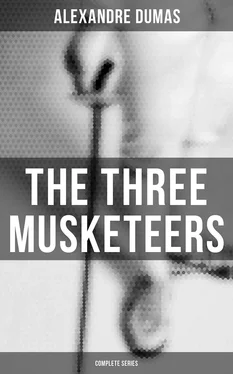The queen appeared cheerful and happy, which seemed to astonish the persons who surrounded her and who were accustomed to see her almost always sad and full of care. The queen attributed this joyous feeling to the beauty of the fete, to the pleasure she had experienced in the ballet; and as it is not permissible to contradict a queen, whether she smile or weep, everybody expatiated on the gallantry of the aldermen of the city of Paris.
Although d’Artagnan did not at all know the queen, he soon distinguished her voice from the others, at first by a slightly foreign accent, and next by that tone of domination naturally impressed upon all royal words. He heard her approach and withdraw from the partially open door; and twice or three times he even saw the shadow of a person intercept the light.
At length a hand and an arm, surpassingly beautiful in their form and whiteness, glided through the tapestry. D’Artagnan at once comprehended that this was his recompense. He cast himself on his knees, seized the hand, and touched it respectfully with his lips. Then the hand was withdrawn, leaving in his an object which he perceived to be a ring. The door immediately closed, and d’Artagnan found himself again in complete obscurity.
D’Artagnan placed the ring on his finger, and again waited; it was evident that all was not yet over. After the reward of his devotion, that of his love was to come. Besides, although the ballet was danced, the evening had scarcely begun. Supper was to be served at three, and the clock of St. Jean had struck three quarters past two.
The sound of voices diminished by degrees in the adjoining chamber. The company was then heard departing; then the door of the closet in which d’Artagnan was, was opened, and Mme. Bonacieux entered.
“You at last?” cried d’Artagnan.
“Silence!” said the young woman, placing her hand upon his lips; “silence, and go the same way you came!”
“But where and when shall I see you again?” cried d’Artagnan.
“A note which you will find at home will tell you. Begone, begone!”
At these words she opened the door of the corridor, and pushed d’Artagnan out of the room. D’Artagnan obeyed like a child, without the least resistance or objection, which proved that he was really in love.
Chapter 23
The Rendezvous
Table of Contents
D’Artagnan ran home immediately, and although it was three o’clock in the morning and he had some of the worst quarters of Paris to traverse, he met with no misadventure. Everyone knows that drunkards and lovers have a protecting deity.
He found the door of his passage open, sprang up the stairs and knocked softly in a manner agreed upon between him and his lackey. Planchet, whom he had sent home two hours before from the Hotel de Ville, telling him to sit up for him, opened the door for him.
“Has anyone brought a letter for me?” asked d’Artagnan, eagerly.
“No one has BROUGHT a letter, monsieur,” replied Planchet; “but one has come of itself.”
“What do you mean, blockhead?”
“I mean to say that when I came in, although I had the key of your apartment in my pocket, and that key had never quit me, I found a letter on the green table cover in your bedroom.”
“And where is that letter?”
“I left it where I found it, monsieur. It is not natural for letters to enter people’s houses in this manner. If the window had been open or even ajar, I should think nothing of it; but, no—all was hermetically sealed. Beware, monsieur; there is certainly some magic underneath.”
Meanwhile, the young man had darted in to his chamber, and opened the letter. It was from Mme. Bonacieux, and was expressed in these terms:
“There are many thanks to be offered to you, and to be transmitted to you. Be this evening about ten o’clock at St. Cloud, in front of the pavilion which stands at the corner of the house of M. d’Estrees.—C.B.”
While reading this letter, d’Artagnan felt his heart dilated and compressed by that delicious spasm which tortures and caresses the hearts of lovers.
It was the first billet he had received; it was the first rendezvous that had been granted him. His heart, swelled by the intoxication of joy, felt ready to dissolve away at the very gate of that terrestrial paradise called Love!
“Well, monsieur,” said Planchet, who had observed his master grow red and pale successively, “did I not guess truly? Is it not some bad affair?”
“You are mistaken, Planchet,” replied d’Artagnan; “and as a proof, there is a crown to drink my health.”
“I am much obliged to Monsieur for the crown he had given me, and I promise him to follow his instructions exactly; but it is not the less true that letters which come in this way into shut-up houses—”
“Fall from heaven, my friend, fall from heaven.”
“Then Monsieur is satisfied?” asked Planchet.
“My dear Planchet, I am the happiest of men!”
“And I may profit by Monsieur’s happiness, and go to bed?”
“Yes, go.”
“May the blessings of heaven fall upon Monsieur! But it is not the less true that that letter—”
And Planchet retired, shaking his head with an air of doubt, which the liberality of d’Artagnan had not entirely effaced.
Left alone, d’Artagnan read and reread his billet. Then he kissed and rekissed twenty times the lines traced by the hand of his beautiful mistress. At length he went to bed, fell asleep, and had golden dreams.
At seven o’clock in the morning he arose and called Planchet, who at the second summons opened the door, his countenance not yet quite freed from the anxiety of the preceding night.
“Planchet,” said d’Artagnan, “I am going out for all day, perhaps. You are, therefore, your own master till seven o’clock in the evening; but at seven o’clock you must hold yourself in readiness with two horses.”
“There!” said Planchet. “We are going again, it appears, to have our hides pierced in all sorts of ways.”
“You will take your musketoon and your pistols.”
“There, now! Didn’t I say so?” cried Planchet. “I was sure of it—the cursed letter!”
“Don’t be afraid, you idiot; there is nothing in hand but a party of pleasure.”
“Ah, like the charming journey the other day, when it rained bullets and produced a crop of steel traps!”
“Well, if you are really afraid, Monsieur Planchet,” resumed d’Artagnan, “I will go without you. I prefer traveling alone to having a companion who entertains the least fear.”
“Monsieur does me wrong,” said Planchet; “I thought he had seen me at work.”
“Yes, but I thought perhaps you had worn out all your courage the first time.”
“Monsieur shall see that upon occasion I have some left; only I beg Monsieur not to be too prodigal of it if he wishes it to last long.”
“Do you believe you have still a certain amount of it to expend this evening?”
“I hope so, monsieur.”
“Well, then, I count on you.”
“At the appointed hour I shall be ready; only I believed that Monsieur had but one horse in the Guard stables.”
“Perhaps there is but one at this moment; but by this evening there will be four.”
“It appears that our journey was a remounting journey, then?”
“Exactly so,” said d’Artagnan; and nodding to Planchet, he went out.
M. Bonacieux was at his door. D’Artagnan’s intention was to go out without speaking to the worthy mercer; but the latter made so polite and friendly a salutation that his tenant felt obliged, not only to stop, but to enter into conversation with him.
Besides, how is it possible to avoid a little condescension toward a husband whose pretty wife has appointed a meeting with you that same evening at St. Cloud, opposite D’Estrees’s pavilion? D’Artagnan approached him with the most amiable air he could assume.
Читать дальше












